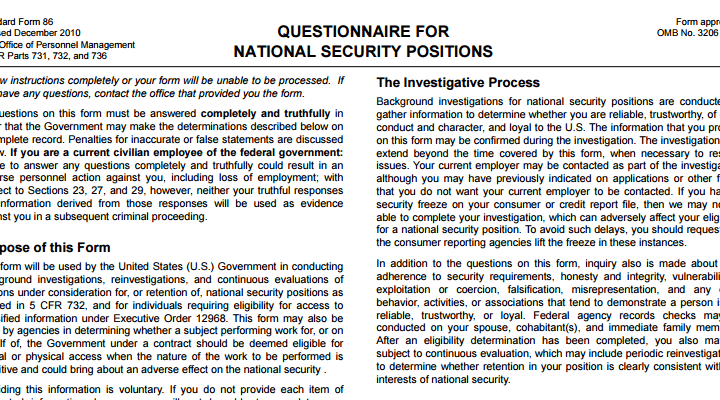On July 30 the Defense Security Service announced its updated SF86, the new form will hopefully go into affect later in August (until then, the 2010 version will still be available). The updated form will look largely the same, but there are a few significant changes security clearance applicants need to be aware of:
- Phone number field
- Marital status types
- Derivative citizenship (citizenship through birth)
- School – new link with assistance for determining address
- Question 21, mental health conditions
- Clarification on marijuana as an illegal/controlled substance
- Question 26 – added Chapter 12 bankruptcy
The good news is all of the changes are designed to make the form – which has been largely unchanged over the past decade – easier to fill out. Incomplete security clearance applications are still a major issue and one aspect of the myriad reasons for today’s epic delays in processing security clearance applications.
With a 690,000 case backlog, it will unfortunately take more than a ‘clean’ SF86 to facilitate a speedy security clearance determination. But if you submit an SF86 with gaps, incorrect addresses and other issues, you can guarantee you’re delaying a final determination. Key changes on the new SF86 are designed to make those errors happen less – from clarifying domestic partnership and marital status to cleaning up the options for providing a phone number (in 1995 who could have guessed that many applicants no longer have a ‘home’ number – just a cell phone).
The biggest policy change in the SF86 is the change to the mental health question. The update to that question is significant, and will eliminate many individuals who may have previously been required to list mental health counseling on their forms. The update clarifies that seeking or receiving mental health counseling or treatment is not an issue for security clearance applicants. The ODNI clarified its interest is “whether an individual has a condition that may affect his or her eligibility for access to classified information (security clearance) or for eligibility to hold a sensitive position.”
The other key change is simply a clarification – as the ‘legalization’ of marijuana becomes more widespread, the SF86 update specifically notes that individuals must list marijuana use on their security clearance applications. The federal government will still consider federal marijuana policy when it considers the drug use of a security clearance applicant.




